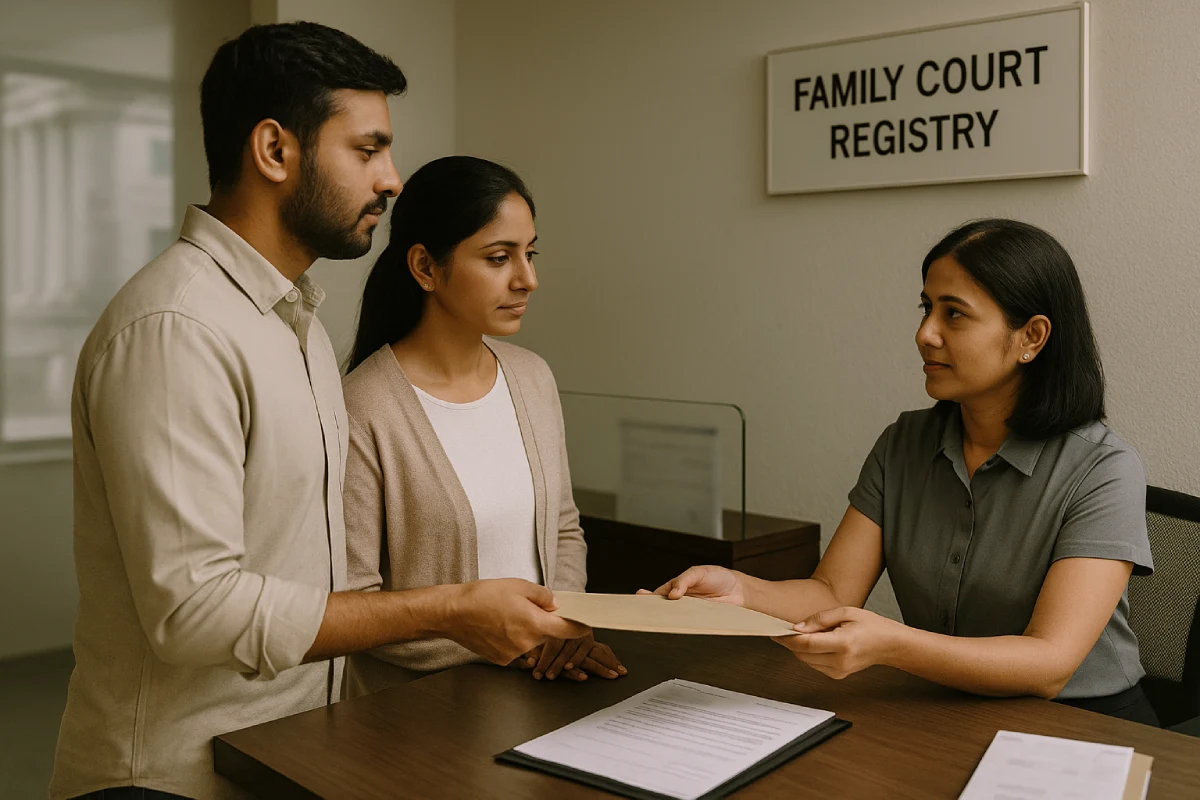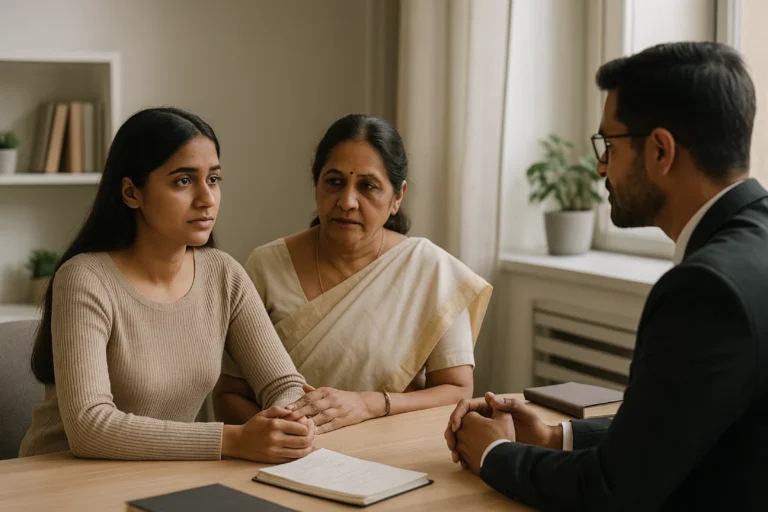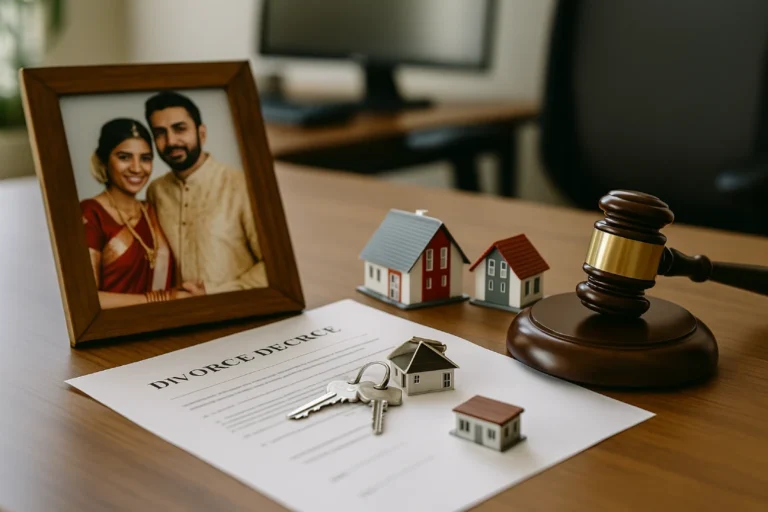What Is Divorce Mediation? A Simple, Practical Guide – 2025
What is Divorce Mediation is a structured, confidential process where a neutral mediator helps spouses reach practical agreements on children, money, and property without a courtroom fight. You stay in control of outcomes. The mediator does not impose decisions. You both discuss options, test solutions, and draft a settlement that can be filed in court.
Why it works: mediation lowers conflict, protects children, saves time and money, and keeps your story private. It also helps you plan for life after separation.
Mediation vs. Litigation: Which suits you?

Court cases focus on winning and losing. Mediation focuses on problem‑solving. In litigation, a judge decides. In mediation, you decide. Many couples use mediation first and move to court only if talks fail. If both of you can sit down, listen, and negotiate with ground rules, mediation is worth trying.
Consider mediation if you want:
- A calmer process that puts children first
- Flexible solutions, not one‑size‑fits‑all orders
- Lower legal fees and faster closure
- Privacy and control over timelines
Consider the court first if there is ongoing violence, severe coercion, or hidden assets. We cover this in “When mediation is not recommended” below.
How Divorce Mediation Works: Step‑by‑Step

This section gives a simple, practical view of how divorce mediation works. It also shows the typical divorce mediation process from start to finish.
Intake & Ground Rules

You meet the mediator together or separately. You sign a confidentiality agreement. The mediator explains roles, neutrality, and fees. Clear rules keep talks safe and respectful.
Issue List & Priorities

You set an agenda: parenting, schedules, school choices, property, loans, maintenance, and any special needs. The mediator helps you list what matters most.
Information Exchange

You gather documents: income, bank statements, loans, housing, investments, and child expenses. Full disclosure builds trust and speeds talks.
Option Building

The mediator helps you brainstorm options for parenting plans, holidays, handovers, budgets, property splits, and debt payoff. You explore trade‑offs.
Negotiation & Reality‑Testing

The mediator checks if proposals are workable. You refine plans for daily routines, school fees, rent or EMI, and health cover. You may meet together or in separate rooms.
Draft Settlement

You write a settlement covering all issues. Lawyers can review it. The draft turns into a consent petition for filing.
Court Filing (if needed)

Your signed settlement usually goes to court mediation or the family court for approval. The judge records terms as a decree in uncontested cases.
This is the core mediation in divorce workflow. Some couples settle in 2–4 sessions. Complex cases take longer.
Who is in the room and what do they do?
Here’s who participates in mediation in divorce and what each person does. The mediator guides the process, but you and your spouse make the decisions.
- The Mediator: Neutral guide. They keep talks fair, flag risks, and help you move from positions to interests. They do not take sides and do not give orders.
- You and Your Spouse: You share facts, needs, and limits. You aim for workable solutions, not perfect wins.
- Your Lawyer (optional but wise): You can take independent advice between sessions. Many couples ask a lawyer to review the draft before the court.
What to Prepare: Documents and Mindset
Come ready with:
- Money: last 6–12 months of bank statements, income proofs, tax returns, and loan statements
- Home & Assets: rent/EMI details, property papers, investments, insurance
- Children: school schedules, activity costs, health needs, holiday plans
- Special Issues: business interests, elderly care, relocation plans
Mindset tips: stay respectful, listen fully, focus on the future, and separate people from problems. Arrive with ideas, not ultimatums. This keeps the divorce mediation process efficient.
Topics You Can Settle in Mediation
Mediation can cover everything a court would decide, often with more detail and flexibility.
1) Parenting Plans
- Weekly schedules and transport
- Holidays, festivals, birthdays
- School choice and activities
- Decision‑making rules for health and education
- Conflict‑reduction tools and communication routines
2) Money, Maintenance, and Budgets
- Interim support during separation
- Long‑term maintenance based on income, needs, and ability to pay
- Cost‑sharing for school, health, and extracurriculars
For a deeper dive on legal principles, see our guide to maintenance and alimony in divorce.
3) Property and Debts
- How to value and divide property and investments
- Handling EMIs, rent, deposits, and loans
- Car, furniture, and appliances
- Who keeps what, and how to equalize fairly
Learn more about the division of property after divorce.
Timelines, Sessions, and Costs
How long does divorce mediation take? Many families finish in 4–8 weeks when they are prepared. Some finish faster. High‑conflict or complex finances may need more time. Session length is 90–150 minutes. You can meet weekly or fortnightly. Costs depend on the mediator’s fee and the number of sessions. Mediation almost always costs less than a court case.
Tip: Set a session calendar on day one. Share documents early. Agree on a budget for temporary support while talks continue. This helps the mediation in divorce keep momentum.
Enforceability, Court Mediation, and Filing
Agreements from court mediation or private mediation can be recorded in court and made binding. In uncontested cases, couples often file a consent petition. If you agree to end the marriage by consent, read our explainer on mutual consent divorce. If talks fail or issues are urgent (like safety), you may proceed with a contested divorce in India while still settling some parts through mediation.
When Divorce Mediation Is Not Recommended

Skip mediation or pause it when any of these apply:
- Ongoing domestic violence or serious threats
- Severe power imbalance or coercive control
- Hiding or destroying financial records
- Untreated addiction that blocks fair talks
- Repeated no‑shows or refusal to share information
In such cases, speak to a lawyer about safety plans, interim orders, and urgent court relief. You can return to mediation later if conditions improve.
Myths vs. Facts
Myth: Mediation means I give up my rights.
Fact: You can take legal advice at every step. You choose what to accept.
Myth: Only “easy” couples can mediate.
Fact: Many high‑conflict couples settle parts of their case in mediation. Even partial deals save time and stress.
Myth: A judge will ignore our mediated plan.
Fact: Courts welcome workable, child‑focused agreements crafted by the parents.
Best Practices for a Strong Outcome
A quick checklist to cut conflict, stay organised, and reach a durable agreement.
- Set clear goals before each session
- Share documents early; avoid surprises
- Focus on interests (stability, school continuity, debt relief), not positions
- Use breaks when emotions spike
- Invite your lawyer to review the draft before filing
- Put the child’s needs at the center of each choice
These habits show how divorce mediation works in real life and why it often succeeds.
FAQs on What is Divorce Mediation
What happens in mediation in divorce?
You and your spouse meet a neutral mediator. You follow a clear agenda: issues, options, negotiation, and a draft settlement. You control decisions. The divorce mediation process ends with a written agreement that you can file in court.
What are the disadvantages of mediation?
It can stall if one person hides assets or refuses to compromise. Power imbalances may need extra safeguards. Some cases need urgent court orders first. Even then, parts of the case can return to court mediation later.
What questions will I be asked in mediation?
Expect practical questions: your goals, your child’s routine, income and expenses, property and loans, and what a safe, fair plan looks like. These questions help the mediator guide mediation in divorce toward workable choices.
What is the success rate of mediation?
Success depends on preparation and good faith. Many families settle most or all issues. Early document sharing, realistic budgets, and child‑first thinking boost success.
When is divorce mediation not recommended?
Avoid mediation during active violence, coercion, or financial concealment. Seek legal protection first. You can try again when safety and transparency improve.
How long does divorce mediation take?
Simple matters may close in 2–4 sessions. Complex finance or high conflict may take more. A steady weekly schedule and full disclosure keep the divorce mediation process moving.
Related Reading (Internal Guides)
- Understand consent‑based endings in mutual consent divorce
- Learn your options if talks fail in a contested divorce in India
- See how courts view support in maintenance and alimony in divorce
- Plan financial splits with division of property after divorce
Conclusion
If you are stressed by conflict, worried about your child’s routine, or unsure about money and housing, divorce mediation can help you design a stable plan. Our family law team guides you through the divorce mediation process, drafts clear terms, and files them correctly.
Talk to our divorce lawyers in Bangalore for a confidential consultation today. Get calm clarity, protect your child’s needs, and move forward with confidence.
This article offers general information. It is not legal advice. For advice on your situation, please speak with our qualified lawyer in Bangalore.







